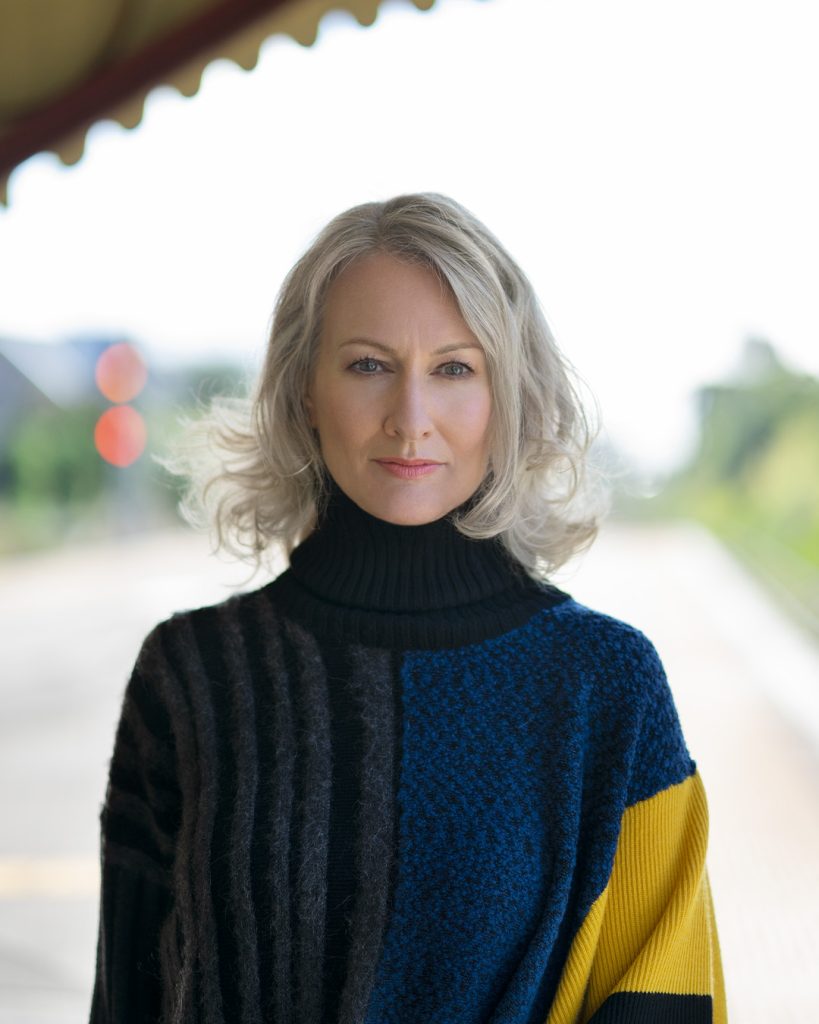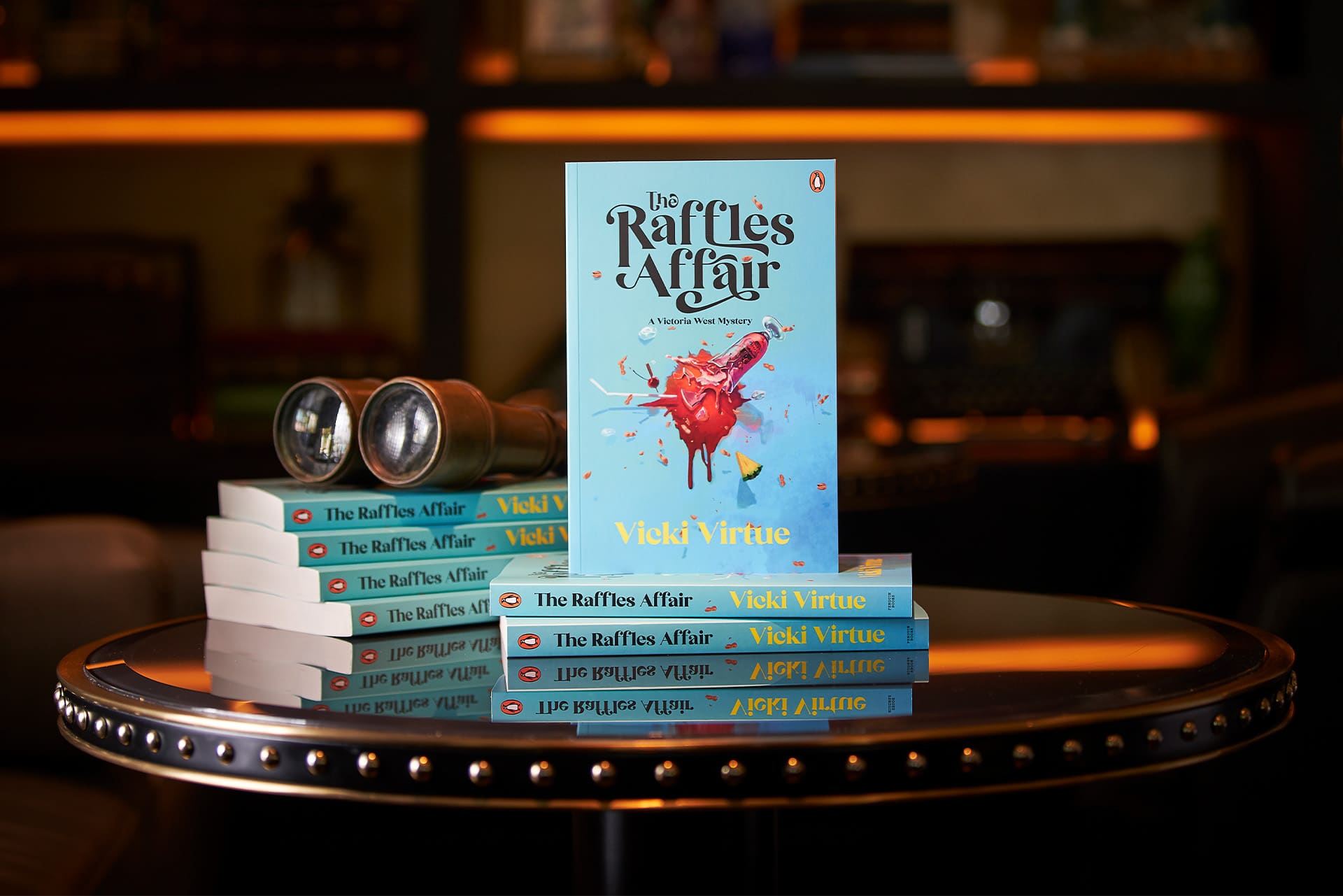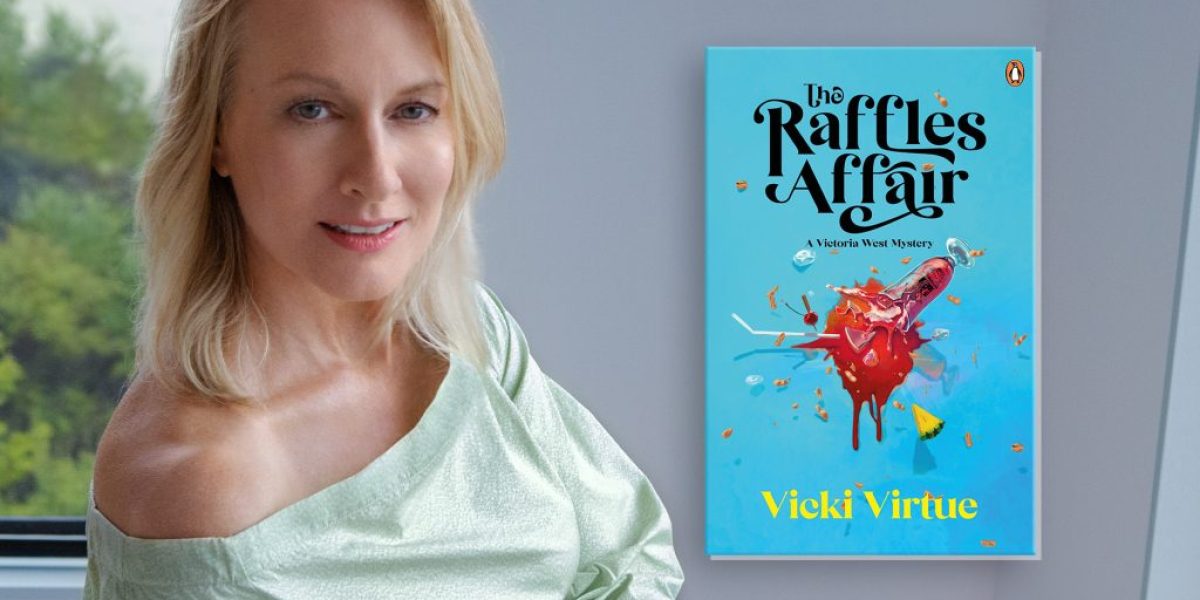Vicki Virtue: Murder, She Writes
The classic ‘who-done-it’ has forever been steeped in the literary landscape. Names like Agatha Christie, Patricia Highsmith, Wickie Collins and Vera Caspery are all writing greats that have stood the test of time to grip readers around the throats and take the air out their lungs.
New Zealand-born writer, Vicki Virtue had from a very young age, read and dreamt about travelling the world like her favourite book characters. At age 19, she set to travelling the world by herself, catching the travel bug to explore every corner of the globe. Whilst travelling, she routinely sent emails back home and was recommended to pursue travel writing. After seeing her first article published online, she had caught not only the travel bug but the writing bug too. It was in Egypt, whilst sailing up the Nile, that she got the inspiration of a strong, beautiful female character, Victoria West. From then on, she was hooked. Just call her a modern-day Agatha Christie. In her first debut novel, The Raffles Affair, Virtue creates a glamorous world that offers a sense of escapism to the reader.
M2woman had the marvellous opportunity to sit down with the writer and talk over her craft, her highly-anticipated residency at the Raffles Hotel and the glamour of the classical ‘whodunnit’.

How do you feel the transition was from travel writer to fiction writer?
Hard. It was very difficult. You go into it completely naive with this great idea—”Oh yeah, I’m gonna do this!” Unfortunately, I didn’t know there were any rules when you wrote fiction. I didn’t even bother taking a Creative Writing course. I just did it to give it a go. I wanted to write a crime novel. I wanted it to be a fun whodunnit. Yes, I have a background as a travel writer, but I really wanted to write a crime that had a travel aspect to it. In that sense, I had a little bit of a comfort zone.
It was learning the rules of writing fiction and learning the rules of writing a crime; what you reveal when and so forth. Of course I just blurted everything out at the beginning, until the editor said:, ‘Oh no, no, no!’ It was a lot of work. At the end it was fun. Now I’m onto book two, it’s much more fun.
What first got you into writing?
I had my own business in New Zealand. I decided to sell that and go travelling. I took a year off to go. This was before social media or blogging or vlogging. I went off to go around Northern and Western Africa and whenever I found an internet connection, I’d send an email back to my friends being like ‘heeey, this is what I’m doing’, whilst also trying to make it as interesting as I could.
A friend of mine who has a PR agency who told me I should try writing a travel article. So I gave it a go, and he said I’d written it like a school essay. He told me to think about all the personality I had put into my emails and tidy up the grammar. After ten drafts or so, he said it was “acceptable”! Then he introduced me Jim Eagles, Travel Editor at the Herald. ‘What a stupid idea,’ I thought after not hearing from him for ages. Then I get an email from him completely out the blue saying: ‘Yeah, I’d love to print your article!’ I remember, I was in Uganda searching for the gorillas and I got chatting a group of travel writers and one of the guys was very encouraging! I told him of a trip to Ethiopia where I fainted and he was like, ‘That’s the start of your next article!’
What’s been really surprising and warming has been the support from the writing community.
Have you always been drawn to reading or writing strong female protagonists?
That just came about! I look at all my friends and see how strong they are. My background is in the advertising industry, which tends to be quite female dominated. Most of my girlfriends have professional careers and have been through their own difficulties in life, so it felt completely natural to me to write about the world I inhabit.
I think having a protagonist who likes to travel was essential for me. I think I would’ve found it quite difficult to have a lead character as a male. Plenty of people do successfully write about the other sex, but I felt new to fiction, so it would be easier for me to write about a world that I know. I found with my first novel (and my second too) that all the major characters were and are pretty strong women. There’s a famous French fashion designer, and there’s a financier and to me that felt very, very natural.
Describe Victoria West…
She’s fabulous! Nowadays, we hear about women’s opinions not being taken seriously, so I felt that it was important to offer a very confident woman. One who is very comfortable. She’s not trying to be something she’s not. Obviously she’s super clever, she’s bright and more stunningly beautiful than anyone else!
I travelled the world by myself (and Victoria travels a lot too!) For me to write about that character was very easy. One of the things that constantly got said to me was, ‘do you feel safe?’ I was a woman travelling the world by myself. It was actually fine. So it was quite important for me to create a character that was doing that as well. Just so people can see, ‘Yeah, this actually is possible’. You don’t have to be a spy to do it. And when you’re living with a character for so long, you want a character you like as well.

Give us a brief rundown of The Raffles Affair…
Our protagonist, Victoria West, has been on a three-month assignment in Eastern Africa. Her friend is getting married in Singapore at the Raffles Hotel. So she thinks, ‘Oh good, I can have a couple of days of complete relaxation beside the pool with my book’. She arrives at the party, only to realise that the groom has been kidnapped.
The reason I set it at Raffles was because I wanted a finite group of people that could have done it! As a former-MI6 agent, Victoria agrees to find him (quite begrudgingly). That then sets off this chain of events that we go through the traditional whodunnit from then on. We start getting different revelations from the different members of the family and then we’ve got to have a couple of deaths!
What I’ve tried to do is not get into the real psychological, nitty-gritty, ‘lets understand why this person did it’. I grew up reading Agatha Christie. I love Agatha! I love the classics! So I wanted to make a modern version of that, in which you could just put your feet up. It’s not going to challenge your brain that much! Just pure escapism.
I started writing before Covid, but right now it feels we need that lightness in our lives. What’s been interesting about the feedback I’m getting is that people have just devoured the book in a weekend! People love getting transported to the Raffles Hotel. A guy actually said, ‘I wish my wife never read it, now she wants to go to Raffles for a week!’
You used to live in Singapore?
I used to live in Singapore. I’ve lived in London and Dubai and Singapore. When I lived in Singapore, I used to go to Raffles just to have a drink. What always appealed to me about Raffles Hotel was the history of the hotel, and the fact that it was the meeting point for global travelers. Anybody there knew you were an adventurer. Back in the late 1800’s, when it was built, that was where you ended up.
Rudyard Kipling’s and the Somerset lot, they would all be writing their books under the trees. So I think for me it was always that history of the hotel that I loved. The first opportunity at Raffles came when I moved back to New Zealand, we were actually going off to climb Kilimanjaro.
We decided that we would stop off for one night at Raffles Hotel on the way back and I just fell in love with the place after having finally stayed there.
This idea of writing a book and writing a murder mystery set at Raffles was kind of perfect. I did wonder if they would mind me murdering people in their hotel. I don’t know what the legalities of that were, you see. So I just dropped the marketing manager an email and said, ‘Oh, by the way…’ They wrote back to me straight away, ‘Sounds fantastic! I popped into the hotel, showed the marketing manager a copy of the book and they offered me a Writer-In-Residence!
Would you be able to say what you would be working on whilst on the residency?
I will be working on the second book. The idea, of course, was to finish the book there under the residency, but Covid kind of threw that out. The book has been launched in Singapore, but it was a bit of a soft launch. When I go over, I’ll do a lot more media events and some events with schools and universities and things like that.
One cool thing is at the Writers Bar there. The head barman is a New York guy actually. He has created a series of cocktails based on the characters in the book. I had great fun one weekend working with him on coming up with names for the cocktail and oh my gosh, some of them sound absolutely divine.
What would you say that your creative processes?
Well, for me, it always starts with the place. Where am I going to sit? And I guess that’s the traveller in me.
What is your definition of success?
This is something I asked myself relatively regularly. What would I do if I’ve only got six months to live? And if I can say, ‘Oh, I would just do more of this, then I think that I’m in a really good position.’ And that, for me, is success. As one gets older, one becomes more aware that life is so fleeting. Success is knowing that I’ve done the things I want to do in my life. And I’ll keep adding to my list of course, but, right now, if you said to me, what if I had six months to live? What would I do? I would I don’t have a long list. I think I’ve done most of the things I really, really want to do. And of course there’s many more than I would like to do.
Want more on the book? Click here.

